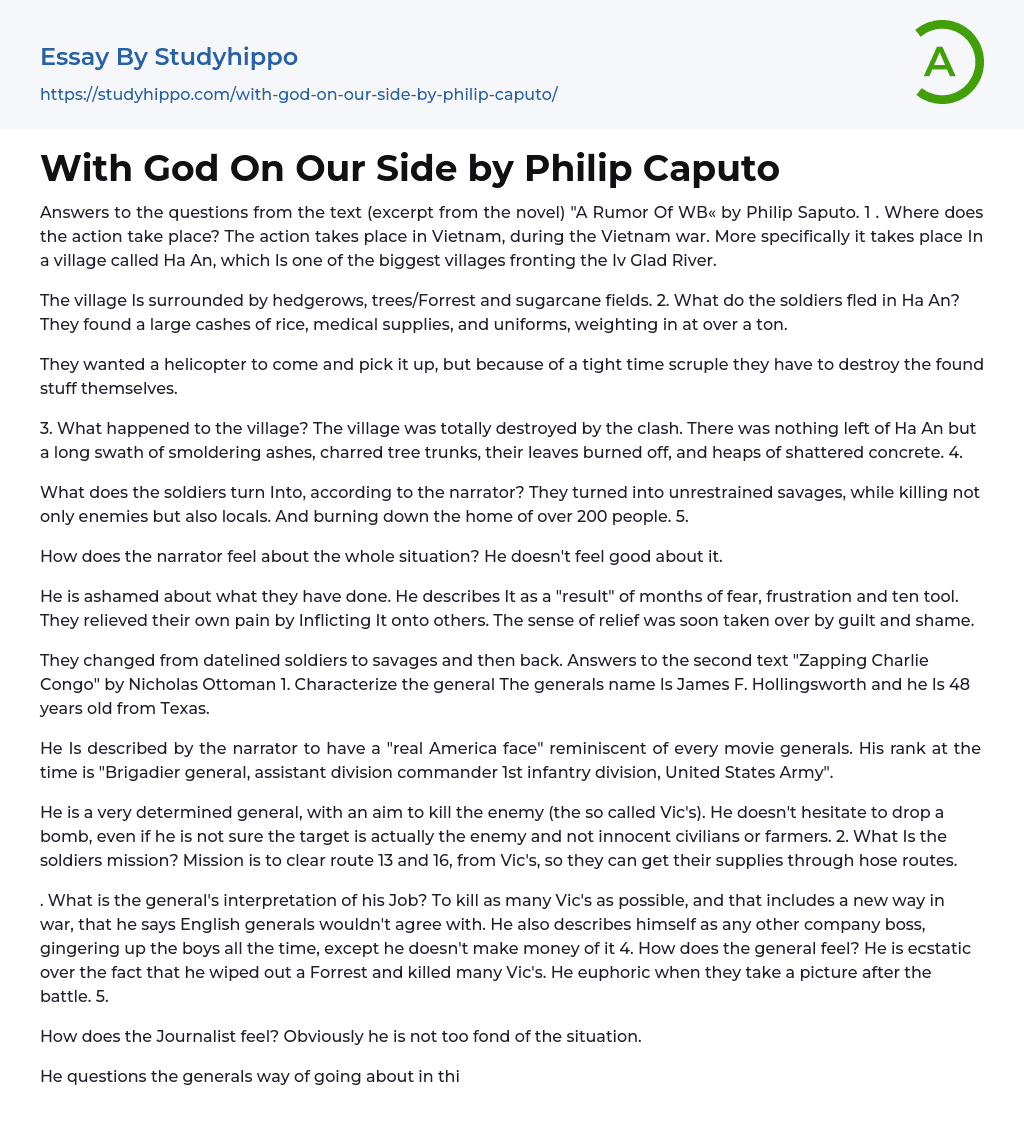Philip Saputo's "A Rumor Of War" narrates the Vietnam War in Ha An village along the Iv Glad River, where soldiers discovered a cache of rice, medical supplies, and uniforms weighing over a ton. Time constraints forced them to destroy it themselves instead of waiting for helicopter pick-up, resulting in the destruction of the village with smoldering ashes, burnt trees, and shattered concrete. The narrator describes how their fear, frustration, and guilt turned soldiers into unrestrained savages who killed both enemies and locals while burning down over 200 homes. This behavior caused them shame and guilt as they transitioned from being soldiers to savages before returning to their original identity. In response to Nicholas Ottoman's "Zapping Charlie Congo," Brigadier General James F. Hollingsworth from Texas aged 48 is assistant division commander at the
...United States Army's 1st Infantry Division characterized by his stereotypical American general appearance.
The general exhibits strong determination to eradicate the enemy, referred to as Vic's. He shows no concern for innocent civilians or farmers who may be affected by collateral damage. The soldiers have been assigned the task of clearing routes 13 and 16 from Vic's to ensure that supply deliveries can be made efficiently. The general views this mission as an opportunity to eliminate a maximum number of Vic's, which he considers an innovative approach not favored by English generals. He compares himself to a typical company boss who motivates his team but does not profit from it. After destroying a forest and killing many Vic's, he is jubilant and even euphoric when taking a photo with his men after the battle. However, the journalist appears critical of the general's
actions during this war.
The journalist questions how one can differentiate between local farmers and enemies while flying in a helicopter. Furthermore, they suggest that the general is a dangerous leader who compels soldiers to commit murder without thinking clearly; perhaps the war has clouded his judgment. The general is willing to employ extreme measures, including breaching ethical boundaries in warfare, in order to defeat his adversaries.
Examples of "New Journalism" techniques used in this text include descriptive language ("dangerous," "crossing the line") and subjective opinions and feelings ("doesn't seem to have his right mind with him," "war has affected him so much").
- Air Force essays
- Army essays
- Soldiers essays
- Army Values essays
- United States Army essays
- Veteran essays
- Aircraft essays
- Sergeant essays
- World War I essays
- World War Ii essays
- Atomic Bomb essays
- American Civil War essays
- Attack essays
- Cold War essays
- Crimean War essays
- Emilio Aguinaldo essays
- Iraq War essays
- Korean War essays
- Nazism essays
- Nuclear Weapon essays
- Philippine Revolution essays
- Trench Warfare essays
- Vietnam War essays
- Western Front essays
- Diplomacy essays
- Emperor essays
- Rwanda essays
- Tribe essays
- Revolutionary War essays
- War of 1812 essays
- Mexican American War essays
- Hitler essays
- The Spanish American War essays
- League Of Nations essays
- Battle Of The Somme essays
- Treaty Of Versailles essays
- Fascism essays
- D-day essays
- Atomic Physics essays
- Atomic Bombings Of Hiroshima And Nagasaki essays
- Electron essays
- Afterlife essays
- Atheism essays
- Bible essays
- Buddhism essays
- Christian Worldview essays
- Christianity essays
- Confession essays
- Cosmological Argument essays
- Deism essays




